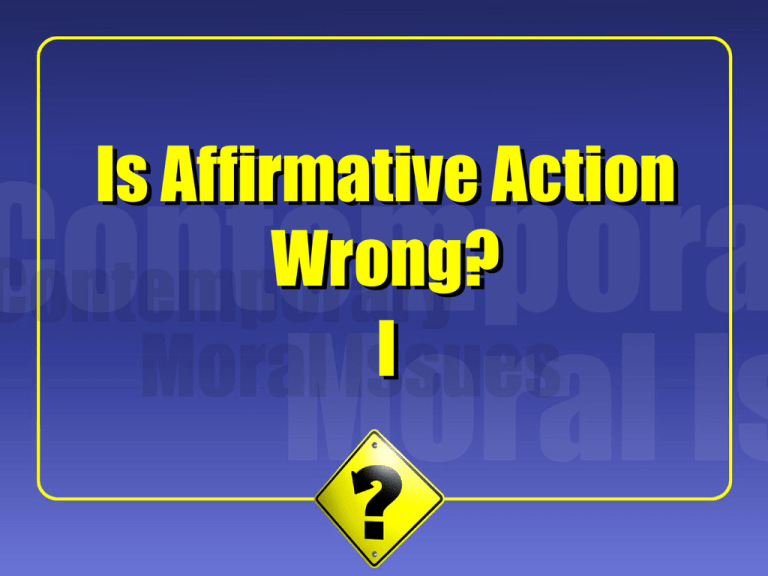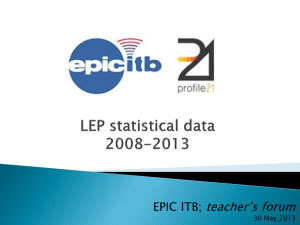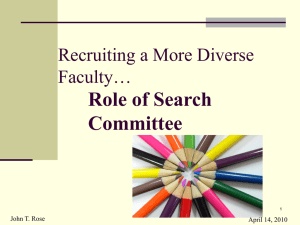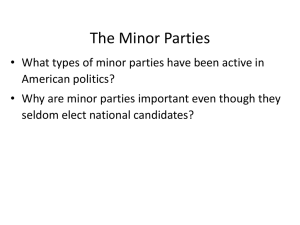
1
Is Affirmative Action
Wrong?
I
2
Judith Jarvis Thomson: “Preferential Hiring”
Thomson’s Central Argument
• In at least a certain range of cases, preferential hiring is not
unjust, but rather morally permissible (and perhaps even
obligatory), where preference is given to a black or to a female
candidate over an equally qualified white or male candidate .
3
Some Difficulties with the Central Case
• Thomson’s central case is specifically one where several
candidates have presented themselves for a job, and where
all are equally qualified for that job, but where the hiring
officer straightway declares for the black candidate (because
he or she is black), or for the female candidate (because she
is female).
• Given the central case that Thomson considers, there are
clearly some difficulties on pragmatic or epistemic grounds
for precisely how it is to be established that all of the
candidates are “equally qualified”.
• Candidates for an academic post are considered on a
number of grounds.
4
Some Difficulties with the Central Case (cont’d)
• Those who write letters of reference can be skewed by
prejudice:
A black male may be down-graded in a letter from a white
professor because of that professor’s dislike of, repulsion
from, or desire to avoid contact with, the candidate.
A woman who is down-graded because she is a woman,
however, is usually not down-graded because she is
disliked, but because she is felt to be “not serious”.
“A teacher could not face himself in the mirror […] if he had
down-graded anyone out of dislike; but a teacher can well
face himself in the mirror if he down-grades someone out of
a conviction that that person is not serious: after all, life is
serious, and jobs and work, and who can take the
unserious seriously? who pays attention to the dilettante?”
(378)
5
Is Race or Sex a Qualification?
• Many who favor preferential hiring see race or sex as a
qualification itself.
If this is, indeed, the case, then hiring which takes into
consideration a candidate’s race or sex is merely a matter
of who is best qualified for a post, and there is no issue of
injustice or any other impropriety.
• So why would race or sex be thought to be a qualification?
Claim #1: Blacks learn better from a black instructor, and
women learn better from a woman instructor (though this is
heard more with regard to blacks than with regard to
women).
Claim #2: What is wanted is role models, and as a result of
the predominance of white males in academia, both black
and female students suffer from constricting ambition.
(Claim #2 may provide a reason for Claim #1)
6
Is Race or Sex a Qualification? (cont’d)
• Claim #1 might not be the sort of consideration that blacks or
women will want to argue for. What if it turns out that whites
and males learn better from whites and males?
• Claim #1 requires some evidence beyond the anecdotal, and
there seems little to be had one way or the other.
• Claim #2, however, seems plainly true: black and women
students do need role-models.
But do they need role models right there in the classroom?
And, if they do, is it the university’s job to provide them?
Surely, it university is not responsible for providing any
service to its students which might be good for them, or
even which they need, so why should the university be
expected to provide role models for its students?
7
Benefits and the Public Sphere
• Public universities provide the most problematic grounds for
preferential hiring because they are supported by public
funds.
• “[N]o perfect stranger has a right to be given a benefit which
is yours to dispose of; no perfect stranger even has a right to
be given an equal chance at getting a benefit which is yours
to dispose of. You not only needn’t give the benefit to the first
perfect stranger who walks in and asks for it; you needn’t
even give him a chance at it.” (380)
• Benefits: things which people would like to have, which would
perhaps not merely please them, but improve their lives, but
which they don’t actually need.
8
How D’Ya Like Them Apples?
• If I have some extra apples (They’re my apples, I grew them
on my own lad, from my own trees.), and am prepared to give
them away, word may get around. People may present
themselves as candidate recipients.
I do not have to give them to the first candidate, or have
candidates draw straws.
If they’re my apples, I can give them to whomever I like, on
any grounds I choose, and yet violate no one’s rights. I treat
no one unjustly.
None of the candidate recipients has a right to the benefit,
or even to a chance at it.
9
How D’Ya Like Them Apples? (cont’d)
• We need to consider four caveats:
1. Some grounds for giving or refraining from giving are less
respectable than others: I can act badly without thereby
violating anyone’s rights or treating anyone unjustly.
2. Although I have a right to dispose of my apples as I wish, I
have no right to harm or gratuitously hurt or offend.
3. If I advertise a first-come-first-served-till-supply-runs-out
policy, then I cannot refuse the first five candidate recipients
because they are black, or white. I have given them a right
to a chance at the apples.
4. Some may say I don’t really—or fully—own the apples,
even if I grew them on my own land, from my own trees.
This seems wrong on its face, but we’ll deal with what is
publicly owned later.
10
Is a Job a Benefit?
• It may be insisted that to give a man a job is not to give him a
benefit, but rather something that he needs.
Granted, that people do need jobs, it does not seem clear
that any candidate for a job in a university needs a job in a
university.
“No one needs that work which would interest him most in
all the whole world of work. Plenty of people have to make
do with work they like less than other work—no economy is
rich enough to provide everyone with the work he likes best
of all—and I should think that this does not mean they lack
something they need.” (381)
If a university job is a benefit (and not something needed),
it is not a “pure” benefit (like an apple), but an “impure” one:
a candidate will only be interested and satisfied if he
actually does the work he is given an opportunity to do, and
does it well.
11
The Eating Club
• Unlike the members of an eating club, the owners of a
university have a responsibility not merely to themselves, but
also to those who come to buy what it offers.
• A (privately-owned) university is normally expected to provide
the best teachers it can afford. If it does otherwise, it does not
act merely irrationally, but violates the rights of its studentcustomers.
• Of course, where the (private) university has to choose
between equally qualified candidates, it violates no one’s
rights by immediately declaring for the black or white
candidate because he is black or white.
12
The Public Sphere, Again
• Most universities enjoy some public support, and moral
issues can be affected by the extent of the burden carried by
the public.
“[W]here a community pays the bills, the community owns
the university.”
• If two members arrive at the eating club, and only one table is
available, the waiter must randomly choose who gets seated.
• Likewise, if someone arrives at the eating club with an apple
tart, the waiter must divide the tart among the diners equally.
• These cases suggest a principle of equal division, or equal
chance , at some benefit available for distribution.
13
The Public Sphere, Again (cont’d)
• Likewise, we can view a community as jointly owned by its
members, who therefore jointly own whatever the community
owns (and, in particular, a public university). As such, each
has a right at an equal share, or equal chance, at university
jobs if a university job is a benefit.
• This said, there would seem to be cases where a member
may (not unjustly) be deprived of this equal chance or equal
share.
• The university’s students have rights to good teaching, which
are surely stronger rights than any member’s right (if there is
such a thing) to an equal chance at the job: the member’s
right would be overridden, not violated.
• Perhaps there is some sense in which everyone has a right
to “equal treatment”, and this is violated by preferential hiring,
but what sort of right is this?
14
Debts and Gratitude
• Suppose our eating club has reason to be especially grateful
to one of its members, Smith, who has done a series of very
great favors for the club.
It seems we might, out of gratitude, and with no impropriety,
provide Smith preferential treatment, say, in offering him the
table, when he is one of two members who arrive when
only one table is available.
• Likewise, if the club owes one of its members a debt (say,
$1000 it borrowed from Dickenson), and the club comes into
the possession of a $1000 painting, it seems it would be just
to not randomize who gets the painting, but to offer it to
Dickenson.
15
Debts and Gratitude (cont’d)
• “If we fail to do anything for Dickenson, we do him an
injustice; if we fail to do anything for Smith, we do him no
injustice—our failing is, not injustice, but ingratitude.” (385)
• Similarly, if there are two candidates for a civil service job,
where A is a veteran, and B is not, it seems we allow for
declaring for A straightway: the country owes him something.
Giving him preference is a not-unjust way in which part of
that debt of gratitude can be paid.
16
Debts and Gratitude (cont’d)
• Granted that failing to make amends to someone we have
wronged is not merely callousness, but injustice:
a) Are the young blacks and women who are amongst the
current applicants for university jobs the ones who were
wronged?
b) Did we, the current members of the community, wrong any
blacks or women?
c) What if the white male applicant for the job has never in
any degree wronged any blacks or women?
• These objections seem wrong-headed: granted, none of the
young candidates will have likely suffered major civil rights
violations, but even young blacks and women have lived
through down-grading for being black and female, or felt the
consequences of down-grading for other blacks and women:
lack of self-confidence and self-respect.
17
Debts and Gratitude (cont’d)
• “Perhaps justice doesn’t require making amends to them as
well; but common decency certainly does.” (386) To fail to do
so might not be injustice, but it is at least as great a failing as
ingratitude.
• The white male candidate may not have done any wrong to
blacks and women, but they have profited from the wrongs
that the community did.
• “My concern has been only to show that the white male
applicant’s right to an equal chance does not make it unjust
to opt for a policy under which blacks and women are given
preference.” (386)
18
Debts and Gratitude (cont’d)
• A policy that gives preferential hiring to black and female
candidates does not ask the young white male applicant to
make amends—it asks no one to give up a job that is already
his: the job for which the white male competes isn’t his, but is
the community’s, and it is the hiring officer who gives it to the
black or woman in the community’s name.
• If there were some appropriate way in which the community
could make amends to its blacks and women without
depriving these whites or men of an equal right, then that
would be preferable to a policy of preferential hiring. “But in
fact the nature of the wrongs done is such as to make jobs
the best and most suitable form of compensation.” (387)







